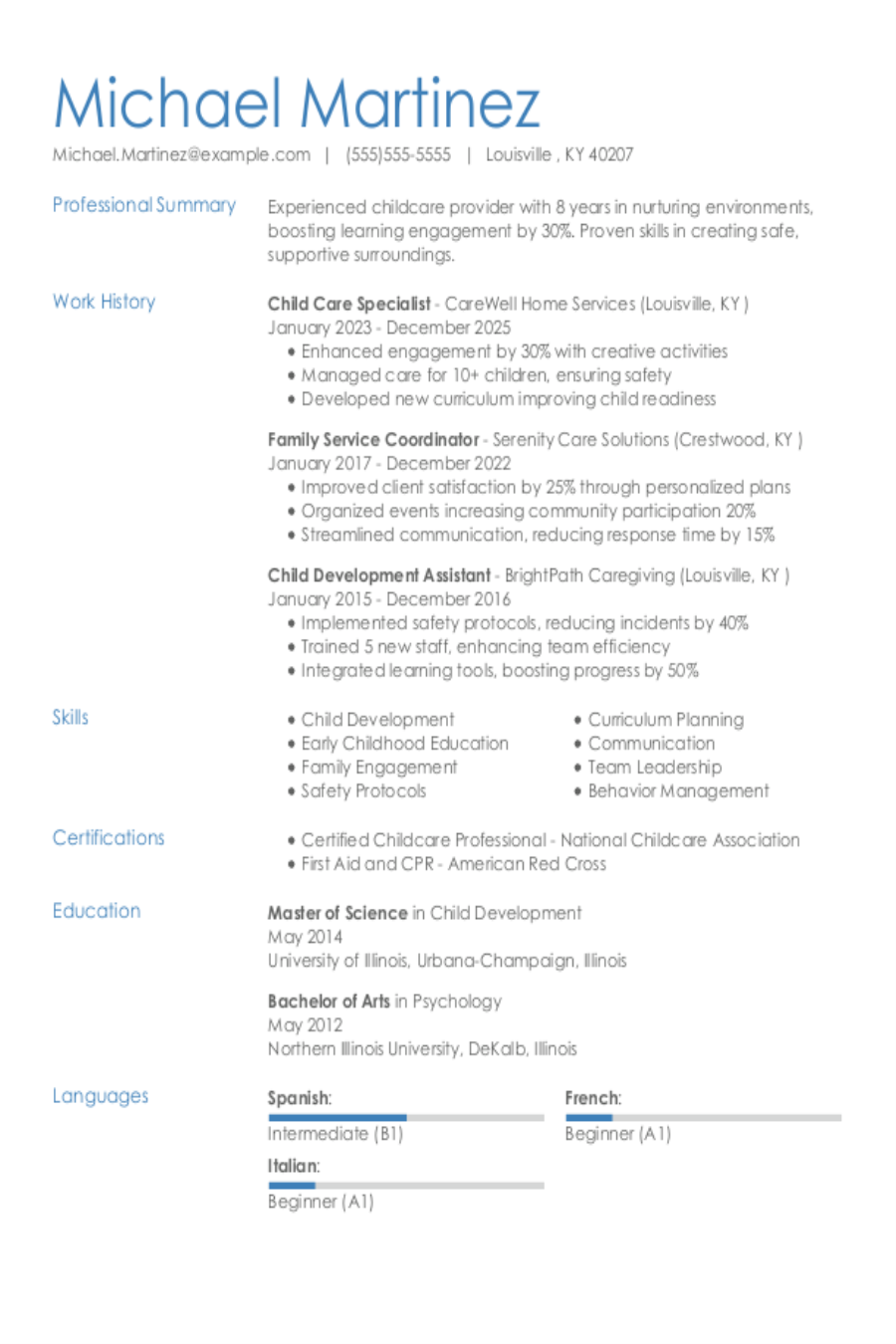Popular Military Resume Examples
Military to civilian resume
A resume for a military candidate seeking a civilian role should translate military experience into concrete results and desirable transferable skills that demonstrate how the candidate is prepared to make this transition.
Focuses on goals: The applicant demonstrates strong leadership and strategic planning skills from military experience, showcasing their ability to improve team efficiency and optimize operations, highlighting a commitment to professional growth in the defense sector.
Uses military experience to demonstrate key skills: This resume uses the candidate's military experience effectively by highlighting quantifiable achievements and transferable abilities.
Experienced military resume
An experienced military professional's resume should emphasize leadership experience, specialized skills, and continuous development to effectively demonstrate their readiness for civilian roles.
Encourages quick scanning: Clear layout and structured design allow hiring managers to quickly identify relevant military qualifications and achievements, improving the overall readability of the resume.
Balances skills and experience: This applicant's resume highlights a strong mix of leadership and strategic planning skills, showcasing significant career advancement while achieving measurable impacts in operational efficiency and risk management.
Military promotion resume
A resume for a military candidate seeking a promotion should emphasize leadership skills, specialized training, and measurable achievements to clearly demonstrate career growth and operational impact.
Lists military-specific qualifications: Listing military education, assignments, and commendations makes this resume stronger and showcases the candidate's readiness for promotion.
Highlights experience: The opening summary of this resume effectively showcases the applicant's extensive military experience and leadership capabilities. By highlighting key achievements, such as a 30% increase in operational efficiency, it establishes a strong professional tone that resonates throughout the document.
More resume examples
Additional Guides
- Amazon
- Analyst
- Architecture
- Art
- Artist
- Arts
- Aviation
- Banking
- Billing
- Biology
- Biotech
- Budtender
- Business
- Business Operations
- Cashier
- Chef
- Chemical Engineering
- Chemistry
- Child Care
- Civil Engineering
- College
- College Graduate
- Communications
- Compliance
- Computer
- Computer Hardware
- Computer Science
- Computer Software
- Construction
- Consultant
- Cook
- Copywriting
- Cosmetology
- Culinary
- Customer Service
- Customer Success Manager
- Cyber Security
- Data Systems Administration
- Dentistry
- Driving
- ECommerce
- Education
- Electrical
- Electrical Engineering
- Engineering
- Entertainment
- Entry Level
- Environmental
- Esthetician
- Event Planning
- Executive
- Fashion
- Federal
- Film
- Finance
- Firefighter
- Fitness & Nutrition
- Food Service
- Government
- Graphic Designer
- Handyman
- Healthcare Support
- High School Student
- Hospitality
- Human Resources
- Industrial Engineering
- Insurance
- Interior Design
- Internship
- Inventory Management
- IT
- Janitorial
- Law
- Law Enforcement
- Legal
- Library Museum
- Logistics
- Maintenance
- Manager
- Marketing
- Mechanical Engineering
- Medical
- Mental Health
- Metal Work
- Music
- Nursing
- Performing Arts
- Pest Control
- Pharmacy Technician
- Photographer
- Physical Therapy
- Pilot
- Plumbing
- Product Manager
- Product Owner
- Production
- Production Assistant
- Program Manager
- Project Manager
- Psychology
- Purchasing
- Quality Control
- Radiologic Technologist
- Real Estate
- Restaurant Manager
- Retail
- Safety Security
- Sales
- Sales Associate
- Scholarship
- Sciences
- Server
- Shipping
- Skilled Trades
- Social Services
- Software Engineer
- Special Education
- Sports
- Statistics
- Stay At Home Mom
- Student
- Supervisor
- Teacher
- Teen
- Training Development
- Transportation
- Travel
- Ux Designer
- Veterinary
- Virtual Assistant
- Waitress
- Web Development
Military Resume Template
Looking to build a standout military resume? Use this template as your guide—simply personalize it with your unique experiences and achievements for maximum impact.
EMILY MARTINEZ
Riverside, CA 92504 | (555) 555-5555 | Emily.Martinez@example.com
Professional Summary
Detail-oriented logistics professional with 8+ years of experience in inventory management, team supervision, and operational coordination in high-pressure environments. Proven ability to improve efficiency, maintain compliance, and lead teams to exceed performance standards.
Education
Courtland Community College | Courtland, AL
05/2019
Associate of Applied Science: Logistics
Skills
- Inventory & Asset Management
- Team Leadership & Training
- Process Improvement
- Safety & Compliance
- Logistics Coordination
- Problem Solving
Professional Experience
Logistics Specialist | US Army – Fort Worth, Texas
10/2019 – Current
- Supervised and trained 14 personnel, increasing team productivity by 20%
- Managed inventory valued at over $3.5M with zero loss or discrepancies
- Coordinated shipment, storage, and distribution of critical equipment across multiple locations
- Implemented new tracking procedures that reduced processing errors by 15%
- Ensured compliance with safety regulations and organizational standards
Supply Clerk | US Army – Fort Carson, Colorado
03/2016 – 10/2019
- Maintained accurate inventory records for over 2,000 equipment items
- Assisted in warehouse organization, improving retrieval time by 25%
- Supported logistics planning for training exercises and deployments
Certifications & Training
- Forklift Operator Certification
- OSHA Safety Training
Writing Your Military Resume
Having explored these effective military resume examples, you're now equipped to make your own. We'll guide you step by step through how to write a resume, ensuring you cover each essential section with confidence.
List your most relevant skills
An effective skills section for a military resume should clearly highlight your relevant abilities and experiences. You want to showcase both your technical skills, such as leadership and logistics, as well as soft skills like teamwork and adaptability. This section provides an excellent opportunity to demonstrate how you meet the specific demands of the role and how your military experience translates to key working skills.
To maximize your chances with recruiters and applicant tracking systems (ATS), carefully review the job listing and incorporate keywords from the job listing into your skills section.
Example of skills on a military resume
- Trained in strategic operations and logistics management
- Proficient in team leadership and conflict resolution
- Adaptable communicator with a focus on collaboration
- Strong analytical skills for tactical planning and execution
A strong skills section showcases a mix of hard and soft skills, illustrating that the job seeker is equipped to tackle technical tasks while effectively collaborating with others. This balance highlights adaptability and readiness for diverse challenges in the workplace.
Highlight your work history
When making your work experience section, it’s essential to focus on your achievements and the skills you’ve developed throughout your military career. This section should highlight specific contributions you've made, showcasing how you applied your skills in challenging environments. Use strong action verbs and quantifiable results to make a powerful impact.
Each job entry should include important information such as your title, the branch of military service or organization, and the dates of service. This clarity helps employers quickly understand your background and establishes your credibility as an applicant.
Example of a military work experience entry
- Logistics Specialist | US Army – Fort Worth, Texas
10/2019 – Present - Lead and manage a team of 10 soldiers during training exercises, fostering teamwork and improving operational efficiency by 30%
- Conduct comprehensive safety drills and risk assessments, resulting in a zero-incident record over two years
- Implement strategic plans for logistics and supply chain management, improving resource allocation by 25%
- Mentor junior personnel through professional development programs, leading to a 40% increase in promotion rates within the unit
- Coordinate multi-unit operations during field exercises, demonstrating exceptional communication skills and adaptability under pressure
Quantifying achievements in the military is essential to showcase your impact effectively. For example, stating that you led a team that reduced operational response time by 40% illustrates your leadership skills and ability to drive significant improvements under pressure.
Turning school and life experience into job skills
Entering the military as a civilian can be an exciting journey, even if your work experience is limited. Remember, your education and any projects you've been involved in can effectively showcase the skills you bring to the table. Whether it's teamwork learned through group assignments or discipline honed during training, these experiences matter and speak volumes about your potential.
Next, think about transferable skills gained from non-work activities. Volunteering at community events, leading a study group, or participating in sports all cultivate traits like leadership, communication, and resilience. These qualities are important in the military context and should be highlighted in your resume.
Key areas to mine for transferable skills
- Leadership experience: Leading a squad, Training new recruits, organizing training exercises
- Team collaboration: Working in diverse teams, joint problem-solving, supporting peers during missions
- Crisis management: Making quick decisions under pressure, handling emergencies effectively
- Technical skills: Operating complex equipment, maintaining machinery
Include your education
The education section of your military resume should be organized in reverse-chronological order, starting with your most recent educational achievements. Include degrees, diplomas, and relevant certifications while omitting high school diplomas if you hold a higher degree.
If you are currently engaged in ongoing education or have incomplete coursework, list the highest level of education achieved along with an expected graduation date. It's beneficial to include bullet points detailing significant coursework or training relevant to your military career.
Common certifications for a military resume
- Certified Defense Financial Manager (CDFM) – American Society of Military Comptrollers (ASMC)
- Project Management Professional (PMP) – Project Management Institute (PMI)
- Security+ Certification – CompTIA
- Lean Six Sigma Green Belt – International Association for Six Sigma Certification
Sum up your resume with an introduction
A strong profile section on your resume is important as it sets the tone for your entire application. It serves as your first opportunity to make a memorable impression, giving hiring managers insight into your qualifications and career goals.
For seasoned job seekers, a professional summary is the ideal choice. This format allows you to showcase significant achievements and relevant experience right at the top of your resume. By highlighting key accomplishments, you enable recruiters to quickly gauge how your background aligns with their needs, making it easier for them to see why you are a strong fit for the position.
If your background is limited, include a goals-based resume objective that reflects your dedication to learning and development.
Professional summary example
Dedicated military professional with over 10 years of experience in leadership and operations management. Demonstrated success in developing strategic training programs and executing tactical missions, leading to improved team performance and operational readiness. Highly skilled in logistics coordination, risk management, and crisis response.
Resume objective example
Eager military job seeker aiming to apply strong leadership, teamwork, and problem-solving skills within a supportive organization. Excited to leverage adaptability and strategic thinking to improve operational efficiency and contribute positively to team missions.
In a military resume profile, your introduction is important for highlighting relevant keywords. Carefully analyze the job description and weave in specific terms that align with the role. This strategic approach not only improves your visibility to hiring managers but also increases the chances of passing through ATS filters effectively.
Add unique sections to set you apart
Incorporating optional resume sections for military positions can effectively highlight your distinct qualifications as a job seeker. These sections allow you to present a fuller picture of your experience and skills.
By including relevant hobbies, volunteer work, or other activities, you illustrate your commitment to values that matter to you. This not only showcases your technical abilities but also reveals soft skills like teamwork and leadership. Sharing these experiences can connect with employers on a personal level, making your application stand out in a competitive field.
Three sections perfect for a military resume
- Relevant Coursework: Including relevant academic coursework on your resume can highlight your skills when work experience is limited. Choose courses that directly apply to the military position you seek, showcasing knowledge of leadership, strategy, and discipline.
- Academic Projects: Including projects on your resume can effectively demonstrate your foundational knowledge in a specific field. Aim to list 3-5 courses that align with the job requirements and showcase your expertise.
- Hobbies and Interests: Including hobbies and interests on a military resume can improve your application when they align with professional skills. Activities such as team sports, leadership training, or volunteering for community service demonstrate teamwork, discipline, and commitment—qualities valued in the military.
5 Resume Formatting Tips
- Choose a format that matches your career stage.
Choosing the right resume format is important for showcasing your experience. If you have a military background, consider a chronological option to highlight your service history. For those transitioning to civilian roles with limited experience, a functional layout can emphasize skills over job titles. A combination approach might work well if you want to showcase both extensive experience and relevant skills.
- Pick a smart resume template.
Using a professional resume template can significantly improve the readability of your document. A well-structured template allows hiring managers to quickly grasp your qualifications. If you opt for a custom format, prioritize clarity and choose fonts that are easy to read and compatible with applicant tracking systems.
- Use an appropriate font.
Select a clear and professional font for your resume to improve readability. Choosing widely accepted options such as Helvetica, Georgia, or Garamond will help ensure your document is easily scanned by both ATS and hiring managers.
- Use consistent formatting.
Ensure your resume is neatly aligned and features uniform margins. This layout improves readability and presents a polished, professional image to potential employers.
- Keep your resume to one or two pages.
When outlining your resume, remember that resumes should be one page long in most cases. If you have extensive experience, a second page can work, but ensure every detail is relevant and concise to showcase your best qualifications effectively.
Tools for Your Job Search
Are you preparing to transition from military service to the civilian workforce? Before submitting your applications, consider leveraging our ATS Resume Checker. This essential tool provides insights into how effectively your resume will perform with automated systems many employers use for initial screening.
Looking to improve your chances of landing that dream job? Our AI Resume Builder is designed specifically for you, offering tailored recommendations based on your military experience along with professional templates that showcase your skills and achievements in a compelling way.
Frequently Asked Questions
Last Updated: January 13, 2026
Absolutely. A cover letter is important because it adds necessary context to your resume and allows you to communicate directly with employers. It’s your opportunity to express why you’re passionate about the role and how your unique experiences in the military make you a perfect fit. So don’t hesitate—write a cover letter that improves your application.
If you're looking for a quick way to create a compelling cover letter, try our AI Cover Letter Generator! It helps you craft personalized letters in just minutes, with various cover letter template options available to match your resume perfectly, ensuring a professional presentation of your skills and background.
A resume is typically a concise document, spanning one to two pages, that highlights your most relevant skills and experiences. In contrast, a curriculum vitae (CV) can extend several pages and provides comprehensive details about your academic background, research, publications, and professional experience.
You should use a CV when applying for specialized positions in academia, science, law, or medicine. If you need to create a CV tailored for your target role, our online CV Maker is designed to help. With various CV templates crafted for different industries and career levels, you can quickly develop an impressive document that showcases your qualifications effectively.
To improve your networking skills in the military, regularly reach out to former service members and colleagues. Consider joining military-focused professional organizations to expand your connections. Keeping your LinkedIn profile updated is essential for staying engaged with opportunities and industry news.
Rehearse common job interview questions and answers to boost your confidence. Being well-prepared allows you to tackle surprises with ease.
To show your dedication to growth in the military field, earn and list relevant certifications. Additionally, highlight any courses you've taken, seminars you've participated in, and professional books or podcasts that keep you informed. Membership in professional associations also reflects your commitment to staying updated on best practices and trends within the industry.
Was this information helpful? Let us know!
Keith is a Certified Professional Resume Writer (CPRW) and trusted media source in the career industry with over a decade of experience helping job seekers stand out.
More resources

63% Expect AI’s Role in Compensation to Grow Significantly in the Next 5 Years
Resume Now s latest report examines how workers are responding...

How to Include Research Skills on a Resume: 40+ Examples
Check out our guide to understand what research skills are and...

How To Write a CV: The Ultimate Guide for 2025
Here is a complete and comprehensive guide to writing a CV ev...

Interview-Winning Entertainment Resumes Examples and Tips
Was this information helpful? Let us know ...



